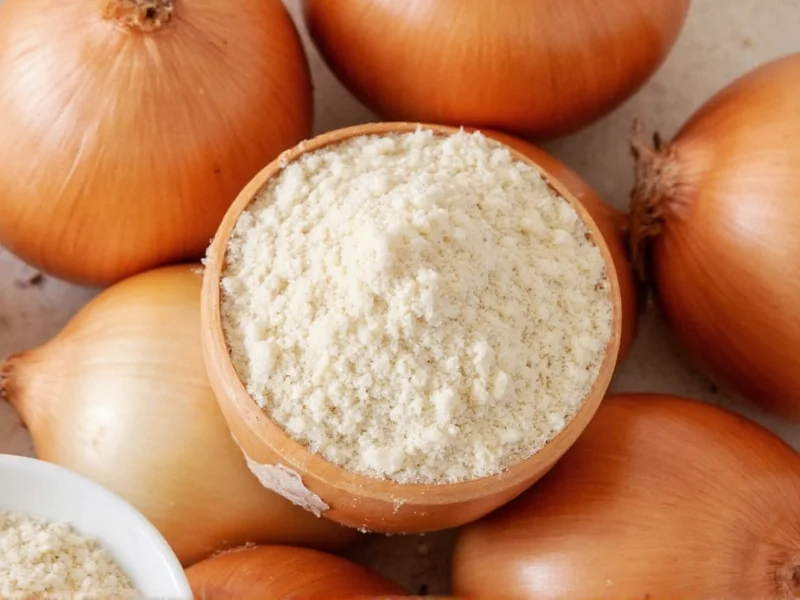When substituting onion powder for fresh onions in your recipes, understanding the proper conversion ratio is essential for maintaining flavor balance. This guide provides accurate measurements and practical tips to help you achieve perfect results every time you need to replace fresh onions with their powdered counterpart.
Understanding Onion Powder Conversion Ratios
The conversion from fresh onions to onion powder isn't simply about volume—it involves understanding how dehydration concentrates flavor. When onions are dried and ground into powder, their moisture content (which makes up about 89% of a fresh onion) is removed, leaving behind concentrated flavor compounds.
| Fresh Onion Measurement | Onion Powder Equivalent | Best For |
|---|---|---|
| 1 medium fresh onion (about 1/2 cup chopped) | 1 tablespoon | Most savory dishes, soups, stews |
| 1 small fresh onion (about 1/4 cup chopped) | 1–1½ teaspoons | Delicately flavored dishes |
| 1 large fresh onion (about 1 cup chopped) | 1½–2 tablespoons | Heartier recipes needing stronger flavor |
Factors Affecting Onion Powder Substitution
Several variables influence how much onion powder you should use when replacing fresh onions:
Onion Variety Matters
Different onion types have varying flavor intensities. Yellow onions (most common in recipes) have a stronger flavor than sweet Vidalia onions. When substituting:
- For yellow onions: Use the standard 1 Tbsp powder = 1 onion ratio
- For sweet onions: Consider using 20-25% less powder to avoid overpowering your dish
- For red onions: The conversion remains similar to yellow onions but note the color difference
Recipe Type Considerations
The cooking method and dish type significantly impact your substitution approach:
- Moisture-dependent recipes (like meatloaf or burgers): Reduce liquid elsewhere by 1–2 tablespoons when using onion powder instead of fresh
- Slow-cooked dishes (stews, braises): Onion powder's flavor holds up better than fresh during long cooking
- Raw applications (salsas, salads): Fresh onions provide texture that powder can't replicate—consider using rehydrated powder or finding another solution
Practical Tips for Perfect Substitution
Professional chefs and experienced home cooks use these techniques when working with onion powder substitutions:
Rehydration Method for Better Flavor Distribution
For recipes where fresh onion texture matters, try this technique:
- Mix 1 tablespoon onion powder with 2–3 tablespoons warm water
- Add 1/4 teaspoon vinegar or lemon juice to reactivate flavor compounds
- Let sit for 5–10 minutes before adding to your recipe
- This creates a paste that more closely mimics fresh onion's moisture and distribution
Taste and Adjust Approach
Always follow this process when substituting:
- Start with 75% of the recommended powder amount
- Cook your dish for at least 15 minutes to allow flavors to develop
- Taste and add more powder in 1/4 teaspoon increments
- Remember that heat intensifies onion flavor during cooking
When Not to Substitute Onion Powder
While convenient, onion powder isn't always the best substitute. Avoid using it when:
- The recipe specifically relies on fresh onion's texture (like French onion soup topping)
- Creating raw dishes where the sharp bite of fresh onion is essential
- Following baking recipes where moisture content is precisely calibrated
- Preparing dishes for people with sensitive palates (powder can have a more intense, sometimes bitter flavor)
Storage and Quality Considerations
The age and storage conditions of your onion powder significantly impact its potency:
- Freshly opened onion powder: Use standard conversion ratios
- Powder stored more than 6 months: Increase amount by 25% as flavor degrades over time
- Powder exposed to humidity: May clump and lose potency—sift before measuring
Store onion powder in an airtight container away from light and heat to maintain maximum flavor for up to 18 months. Properly stored, it retains about 80% of its original potency for the first year.
Common Substitution Mistakes to Avoid
Many home cooks make these errors when substituting onion powder for fresh onions:
- Using equal volume measurements (1 cup powder for 1 cup fresh onion) – this creates overpowering, bitter results
- Adding powder directly to dry spice mixes without considering how it will distribute in the final dish
- Not accounting for salt content – many commercial onion powders contain anti-caking agents with salt
- Substituting in delicate dishes like vinaigrettes where fresh onion's texture matters











 浙公网安备
33010002000092号
浙公网安备
33010002000092号 浙B2-20120091-4
浙B2-20120091-4